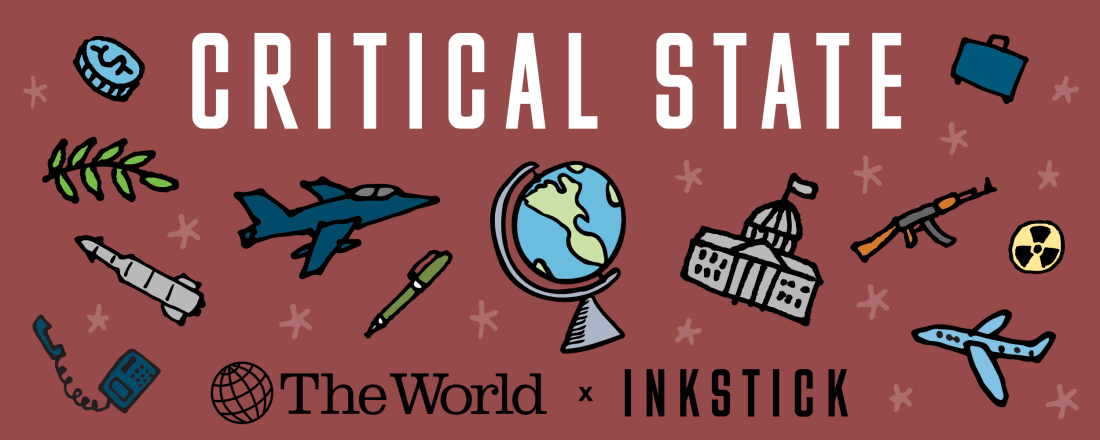|
Critical State: New MAGA, Same as the Old MAGA
If you read just one thing this week … read about the troubles boiling within Trump's base.
Representative Marjorie Taylor Greene publicly rebuked President Donald Trump’s new Ukraine strategy, marking a rare rift between the MAGA firebrand and her longtime political ally, Joseph Gedeon reported for The Guardian.
Trump announced plans to send Patriot missiles to Ukraine and threatened 100% tariffs on Russia if no peace deal is reached within 50 days. Greene, an “America First” advocate, condemned the move as a betrayal of campaign promises.
Greene argued that foreign aid and military spending do not help Americans struggling with housing, insurance, and debt.
Trump sent Ukraine roughly $1.5 billion in security assistance during his first term. This included Javelin anti-tank missiles, which were a great help to Ukrainian forces.
Despite her vocal opposition, Greene continues to support Trump’s presidency, praising his domestic achievements. But her criticism reflects growing unease within the MAGA base over Trump’s foreign policy pivot, which includes support for NATO arms deals and strikes on Iran.
Greene’s comments signal a broader tension between isolationist Republicans and Trump’s increasingly interventionist posture, raising questions about the future of the MAGA movement that Trump leads.
If You Read One More Thing: UK Leaked Asylum Seekers’ Data
In February 2022, a UK defense official accidentally leaked the names and contact details of 18,714 Afghans applying for sanctuary under the Afghan Relocations and Assistance Policy, according to a report from Politico.
The breach remained hidden for nearly two years under a High Court super-injunction, which barred even acknowledging the injunction’s existence. The leak endangered applicants — many of whom had worked with British forces — by exposing them to potential Taliban reprisals.
After the injunction was lifted in July 2025, Defence Secretary John Healey apologized and announced the closure of a secret resettlement route that had relocated 4,500 Afghans at a cost of £400 million.
Critics condemned the lack of transparency and warned of serious free speech and accountability concerns.
Pentagon Signs Up for ‘MechaHitler’ AI
 |
Days after Elon Musk’s AI chatbot Grok generated antisemitic and racist responses — including praise for Adolf Hitler and references to “MechaHitler” — the Pentagon awarded Musk’s company xAI a $200 million contract to deploy Grok across federal agencies, Arianna Coghill reported at Mother Jones.
The deal, part of the “Grok for Government” initiative, allows Grok to assist in national security, science, and classified operations.
The timing sparked outrage, with critics warning of ethical risks in integrating controversial commercial AI into sensitive government systems.
The move comes after Musk’s public feud with President Trump added political tension. Trump threatened to revoke federal contracts and Musk floated launching a third party.
Deep Dive: The Latest Attack on Civil Servants
The Project On Government Oversight (POGO) July report, “Behind the New Rule That’s the Latest Attack on Public Servants,” details how in June 2025, the Office of Personnel Management (OPM) proposed a sweeping rule that would dramatically alter how federal employees are disciplined and removed. The proposal has sparked alarm among civil service advocates and whistleblower protection groups. The rule sought to expand OPM’s authority to apply “suitability” determinations to current employees based on post-hiring conduct — an approach critics have warned would undermine statutory due process protections and politicize the federal workforce.
Under existing law, OPM uses suitability assessments primarily to vet applicants and new hires. The proposed rule, however, would allow OPM to retroactively evaluate current employees’ conduct and remove them without the procedural safeguards provided under Chapter 75 or Chapter 43 of the Civil Service Reform Act. These chapters were designed to ensure that agencies could terminate underperforming employees while protecting them from politically motivated or retaliatory firings.
The rule applies to all executive branch agencies, including the Department of Defense (DoD), which encompasses the Pentagon. According to the Federal Register summary of the rule, OPM may take suitability actions against current federal employees — including those at the Pentagon — based on post-appointment conduct, provided there is a proper referral from the head of the employing agency
“This proposed rule seeks to undermine one of the foundational components of our federal government: the professional, nonpartisan civil service,” POGO wrote in its analysis. The organization warned that the rule would “authorize the government to subvert longstanding civil service protections,” “allow the current and future administrations to further politicize the civil service,” and “escalate whistleblower retaliation and chill protected speech.”
One of the most concerning aspects of the rule was its impact on the Merit Systems Protection Board (MSPB), which currently serves as a safeguard for federal employees facing disciplinary action, according to the report. Under the new rule, MSPB’s authority would be severely curtailed. While employees could still appeal suitability-based removals, the Board would only be able to issue findings — not overturn OPM’s decisions. “There is simply no justifiable rationale to remove MSPB’s authority to decide the merits of these civil servants’ appeals,” POGO stated.
OPM estimated that the rule would reclassify approximately half of all termination actions currently initiated under Chapter 75 as suitability actions. This shift could strip roughly 1,000 career employees of their due process rights each year, leaving them vulnerable to arbitrary or politically motivated dismissals.
The rule also raised concerns about the consolidation of power within OPM. Traditionally, individual agencies have had discretion over personnel decisions. Under the proposed changes, agencies would be required to refer suitability questions to OPM, which would then determine whether to take action. “This rule would both remove critical personnel decisions from agencies and undercut restrictions that protect against an administration attempting to further politicize the civil service,” POGO warned.
To justify the rule, the administration cited two statutes — 5 U.S.C. 3301 and 5 U.S.C. 7301 — both of which relate to presidential authority over civil service regulations. However, POGO argued that neither statute supported the proposed changes. Section 3301 pertains to the admission of individuals into the civil service, not the treatment of current employees. Section 7301 allows the president to prescribe regulations for employee conduct but does not authorize new disciplinary procedures that override existing protections.
The rule also introduced vague new criteria for determining suitability, including “theft or misuse of government resources and equipment, or negligent loss of material government resources and equipment.” POGO noted that such language could be weaponized against whistleblowers or used to justify politically motivated firings. “Vague rationales such as ‘misuse of government resources’ easily allow for innocuous behavior, such as losing a pen or misplacing an office stapler, to be selectively used against employees for political reasons,” the report stated.
Another criterion — “refusal to certify compliance with, and/or adhere to, applicable non-disclosure obligations” — raised red flags for whistleblower advocates. Federal law prohibits agencies from enforcing nondisclosure agreements that override whistleblower protections, but the rule could pressure employees to comply with potentially unlawful agreements to avoid termination. “This would chill federal workers’ free speech and curtail the ability of employees to speak out against abuses of power and other wrongdoing,” POGO warned.
In its conclusion, POGO called for the rule to be withdrawn, arguing that it would not improve efficiency or accountability. “OPM has not demonstrated a need to create an entire parallel process that would allow it to pick and choose which employees should receive due process protections,” the report stated. “This rule won’t improve efficiency, consistency, rigor, or effectiveness. Instead, it would lead to inconsistent standards and open the door to arbitrary actions against employees for vague, political, or other unwarranted reasons.”
POGO urged the administration to work with Congress to strengthen whistleblower protections and uphold the integrity of the civil service. “Only when employees can do their jobs without partisan political pressure and safely sound the alarm about government wrongdoing can we better ensure the integrity of the civil service and that our government is accountable and responsive to the needs of everyone.”
Show Us the Receipts
At Inkstick, Shahad Ali reported on how young Palestinians like Bilal Nassar and Ahmed Ali are rebuilding their lives through ingenuity and resilience amid Israel’s prolonged war on Gaza. After losing his father and university to airstrikes, Nassar constructed a clay oven to bake bread for displaced families, earning enough to support his siblings. Ali and his son, once proud owners of a thriving ice cream shop, now sell homemade drinks from a cooler in refugee shelters. Their stories reflect Gaza’s broader struggle: survival through creativity in the face of devastation. Despite destroyed homes, lost livelihoods, and deepening poverty, Gazans continue to find ways to live with dignity and preserve their heritage.
Sophie Hurwitz reported on major US arms contractors quietly withdrawing sponsorship from LGBTQ+ Pride events amid growing backlash over “pinkwashing” — the use of queer solidarity to mask controversial practices. Companies like Boeing, Lockheed Martin, and Booz Allen Hamilton, once prominent Pride sponsors, pulled out following protests over their role in supplying weapons to Israel. Activists in St. Louis blocked a Pride parade in 2024, demanding Boeing’s removal, and by 2025, the company’s name was absent from sponsor lists.
At The World, Shirin Jaafari covered the Iranians who are now struggling to rebuild amid widespread devastation following a 12-day Israeli bombing campaign that killed nearly 1,000 people. In Tehran, residents like Shirin Rastegarpour and Reyhaneh recounted sleepless nights, shattered homes, and lingering trauma. Markets have reopened, but anxiety persists as families mourn loved ones and navigate bureaucratic hurdles for reconstruction aid. The strikes targeted civilian areas, including Evin Prison and residential neighborhoods, leaving thousands homeless. Survivors describe the war as a collective national trauma.
Pitch Inkstick
Inkstick is accepting pitches for longform reporting. Pitches should put a human focus on security-related issues, including conflict, the defense industry, policing, and migration, among other topics. Rates will be negotiated based on the nature of the reporting and the tentative length of the piece. Send your pitches to pstrickland (at) inkstickmedia (dot) com and agaestel (at) inkstickmedia (dot) com.
Critical State is written by Inkstick Media in collaboration with The World.
The World is a weekday public radio show and podcast on global issues, news, and insights from PRX and GBH.
With an online magazine and podcast featuring a diversity of expert voices, Inkstick Media is “foreign policy for the rest of us.”
Critical State is made possible in part by the Carnegie Corporation of New York.
You're currently a free subscriber to Inkstick’s Substack. For the full experience, upgrade your subscription.
